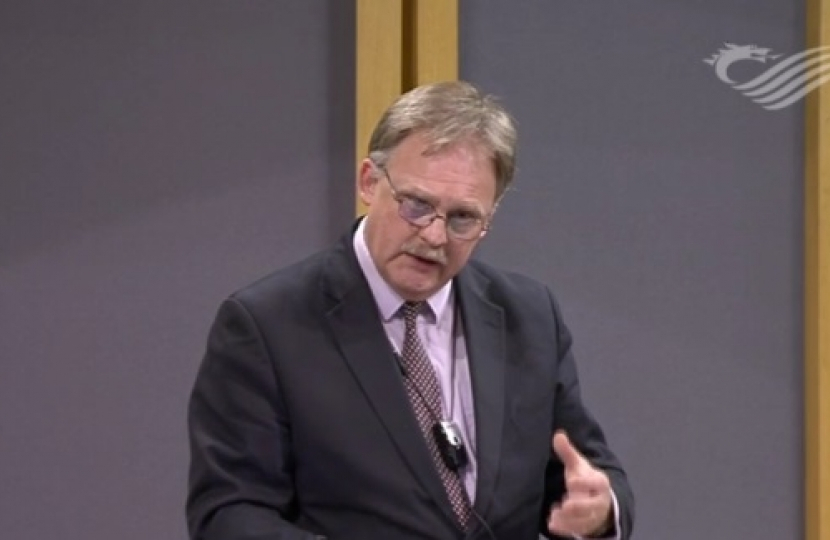
With hospices in Wales receiving less Government funding as a proportion of expenditure than those in England and Scotland, and many “being forced to make difficult decisions”, North Wales MS and Chair of the Senedd Cross-Party Group on Hospices and Palliative Care, Mark Isherwood, is calling on the Welsh Government to take action to ensure that every person in Wales can access the Palliative care they need.
Speaking in his Senedd debate today, ‘Securing Welsh Hospice Care in the Future”, Mr Isherwood said that Hospices reduce unnecessary hospital admissions, support timely and efficient discharges, and ease the pressure on GPs, District Nurses, and social care teams, and expressed concern that, despite the scale and significance of their contribution, Hospices continue to rely heavily on charitable donations.
He said:
“On average, nearly 70 per cent of the cost of delivering Hospice services is met through fundraising. Collectively, Hospices invest approximately £30 million of charitable money into the health and care system in Wales each year.
“Over the next 25 years, the need for palliative care is projected to increase by approximately 25 per cent. This rise is driven by an ageing population, the increasing complexity of medical conditions, and deepening health inequalities.
“Bangor University Research last year found that the mean cost for a Hospice patient staying for fourteen days was £5,708, compared to £6,860 for the cheapest hospital-based option in Betsi Cadwaladr University Health Board, and that significant public expenditure savings can be achieved through increased utilisation of Hospice-based care, where statutory funding as a proportion of Hospice care expenditure across Wales was just 30% and St. David’s Hospice states that they receive just 24%.”
“Despite being promised a share of the £3million allocated in the Welsh Government Budget, neither of Wales’ two children's hospices, Tŷ Hafan or Tŷ Gobaith, have received notification of what their allocation will be or when they are likely to receive it. To meet the needs of the growing number of children in Wales with a life limiting or life shortening condition, they are calling for a sustainable and ringfenced funding settlement, beginning at 25% of their care costs in 2025 and rising 1% annually to 30% 2030, still below the current average for adult Hospices in Wales.
“Despite welcome one-off support packages from Welsh Government in recent years, Hospices continue to face serious sustainability challenges. Hospices are grappling with the financial impact of annual Agenda for Change increases, which will result in a 3.6 per cent rise in staffing costs for 2025–2026, and of National Insurance increases, with an estimated impact of £1.3 million for the same period. And all of this is compounded by the increased cost-of-living, which affects staff, patients, and the ability to fundraise.
“As a result, Hospices are forecasting deficit budgets for 2025– 26. Many are being forced to make difficult decisions - including drawing on reserves to meet shortfalls, reducing inpatient beds, scaling back wider hospice support services, delaying recruitment and the backfilling of vacant positions, and postponing plans to introduce or expand services. Looking ahead, the vast majority of hospices in Wales say that staffing and cost pressures are highly likely to result in the reduction of certain services.
“That was laid bare in July when it was announced that four in-patient beds at St David’s Hospice in Holyhead will temporarily close from October 2025. Prior to the public announcement, St David’s contacted me confidentially to share that they were forced to pause operations at their four-bed in-patient hospice in Holyhead because “it had become increasingly challenging to continue running all of our services due to rising costs and reduced income”. They had already made significant cost reductions and found efficiencies, yet still reached an unsustainable position.”
He added:
“Overall, Hospices in Wales receive less Government funding as a proportion of expenditure than those in England and Scotland. This disparity must be addressed.
“Hospice care is not a luxury, it is a necessity. Let us ensure that every person in Wales can access the Palliative care they need, when they need it, with respect, compassion, and the certainty that they and their families will be treated with care and dignity in their final days.”
